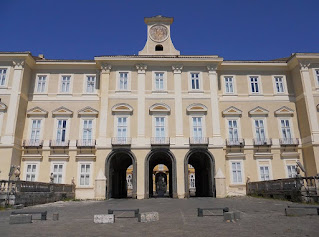Musical member of the Acton family was born in Naples
_-_Archivio_Storico_Ricordi_FOTO000539.jpg) |
| Carlo Acton was the nephew of the former PM of Naples, Sir John Acton |
Carlo became a concert pianist and is particularly remembered for composing the opera Una cena in convitto.
His father, Francis Charles Acton, was the youngest son of General Joseph Acton, and he was also the younger brother of Sir John Acton, the sixth Baronet.
Sir John Acton, Carlo’s uncle, had served as Commander of the naval forces of the Grand Duchy of Tuscany and as the Prime Minister of the Kingdom of Naples while the city was under the rule of King Ferdinand IV. He was the son of Edward Acton, an English physician who had settled in France, and he was the great-grandson of Sir Walter Acton, the second Baronet.
Sir John had succeeded to the title and the family estate in Shropshire in 1791 on the death of his second cousin once removed.
Following his distinguished service in the navy of the Grand Duchy of Tuscany, Sir John was invited to Naples by Queen Maria Carolina and he was asked to reorganize the Neapolitan navy.
 |
| Sir John Acton served as prime minister of Naples under the rule of Ferdinand IV |
Carlo died at Portici, a small port to the south of Naples, in 1909, at the age of 89.
The Acton family's connection with Naples continued into the 20th century. Sir Harold Acton (1904-1994), the British writer, scholar, and aesthete who was born and died at Villa La Pietra outside Florence, was the author of an authoritative two-volume history of the kingdom of Naples under the Bourbons: The Bourbons of Naples (1957) and The Last Bourbons of Naples (1961).
 |
| The Villa Pignatelli is set in beautiful gardens in Riviera di Chiaia |
An Acton family landmark worth seeing in Naples is Villa Pignatelli, a house commissioned by Carlo’s cousin, the seventh Baronet, Sir Ferdinand Richard Edward Dalberg-Acton, in 1826, three years before the birth of the composer. The villa is in the Riviera di Chiaia in Naples, which is a long street running along the sea front and the Doric columns along the front of the villa can still be seen from the road. It was designed as a neo-classical residence that would be the centrepiece of a park. The property has changed hands several time since the death of Sir Ferdinand in 1841. It was purchased by Carl Mayer von Rothschild, a member of the German family of financiers. Later, it was used by the Jewish community of Naples for services. It was then sold to the Duke of Monteleon, whose widow, Princess Rosa Fici, left it to the Italian state in her will in 1852. Villa Pignatelli now houses a coach museum and a collection of 18th and 19th century English and French vehicles.
 |
| The Royal Palace of Portici was built as a home for Charles III of Spain, King of Naples and Sicily |
Portici, where Carlo Eduardo Acton died, is a town at the foot of Mount Vesuvius situated on the Bay of Naples, about eight kilometers (five miles) southeast of the city of Naples. The city had been destroyed by the eruption of Vesuvius in 1631, but was later rebuilt. Charles III of Spain, King of Naples and Sicily, built a royal palace in the town between 1738 and 1749. A botanical garden run by the Faculty of Agriculture of the University of Naples is now located there. The garden has an important collection of desert plants, which include specimens from South Africa and Madagascar. The gardens are open to the public from Monday to Friday in the mornings, and can be visited free of charge.
Also on this day:
79: Vesuvius erupts, destroying Pompeii and other cities
665: The death of Saint Patricia of Naples
1509: The birth of Borgia cardinal Ippolito II d'Este
1609: Galileo demonstrates the potential of telescope
1691: The birth of architect Alessandro Galilei
No comments:
Post a Comment